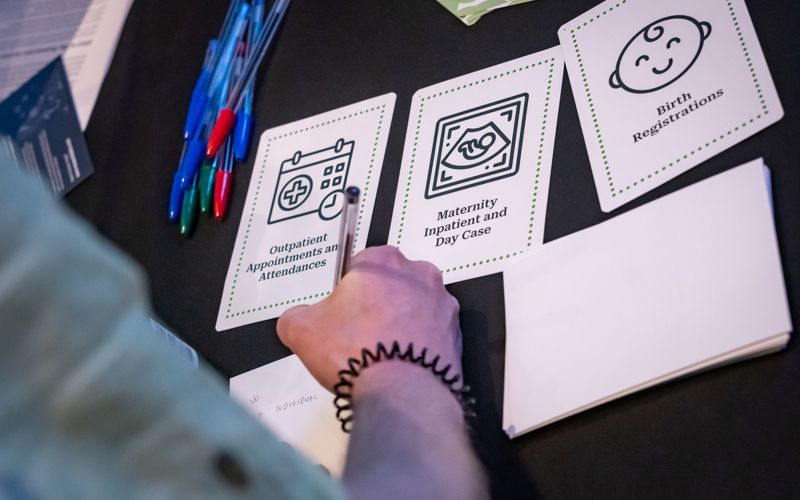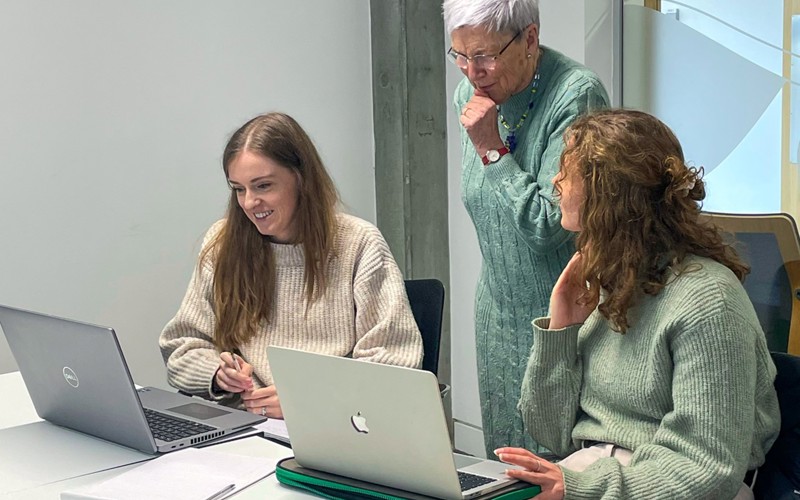
RDS strengthens public involvement for research access
Members of the public will provide early feedback on research applications as part of a new advisory group.
13 Oct 2025

Emma Devine | Average reading time 5 minutes
14 Oct 2025
Research Data Scotland (RDS) is committed to shaping its services around the needs of researchers and data users. Discover some of our highlights from the last year in this blog post by Emma Devine, User Engagement Officer.
At Research Data Scotland (RDS), we strive to make evidence-based decisions to shape and develop our services with the needs of users in mind. To achieve this aim, we engage with users through various activities, including user testing sessions, surveys, workshops, and webinars.
We advertise these activities through our Engagement Contact List, where participants can sign up to get involved in a range of areas including data access processes, synthetic data, metadata and more.
In the past year alone, RDS has engaged with over 350 individuals through various activities to share information about and gather feedback on our services and workstreams.
Some of our user engagement highlights over the past year include:
One of Research Data Scotland’s key workstreams which user input has been invaluable in shaping has been the launch and continuous development of the Researcher Access Service (RAS). Launched in April 2024, the RAS aims to make it faster and simpler to access secure public sector datasets for research.
Interviews with users
Soon after the service launched, multiple interviews were conducted with the recipients of our Accelerator Awards, who were among the first researchers to go through the RAS application process. These interviews took place at various stages throughout the process and aimed to obtain feedback on user experiences, what their expectations were for the service and if/how these expectations were met. Insights from these interviews helped to guide further development of the service.
Usability testing
Earlier this summer, a series of 1:1 usability testing session were carried out with volunteers who had expressed interest in helping shape the RAS. The sessions asked participants to provide feedback on a prototype for the updated RAS application form, which aims to align with the Digital Economy Act Research Code of Practice and Accreditation Criteria.
Initial feedback helped to clarify and streamline the application form as well as improve the guidance for researchers who may not have prior experience of accessing secure data. Also mentioned was the importance to researchers of having access to useful data dictionaries such as the RDS metadata catalogue when completing application forms to make it clearer which variables and additional context they need to see, and this feedback helped the RDS digital delivery team in developing the future of the RAS.
Bespoke introductions for universities and research organisations
As a way to connect directly with researchers to promote the RAS, earlier this year we reached out to universities and other research organisations to introduce RDS and ask if they would be interested in having colleagues come along to present to research groups about the RAS.
During these presentations we introduced the service and asked research groups which types of data they would be most interested in seeing brought into the RAS for quicker and simpler access. To date we have presented to around 120 individuals involved in research at the University of Glasgow, University of Dundee, Heriot-Watt University, University of Edinburgh, Glasgow Caledonian University, the SGSSS Summer School (hosted at Queen Margaret University) and the Institute of Occupational Medicine.
In 2024, multiple synthetic data workshops were delivered to a total of 28 attendees. These sessions introduced synthetic data and the ‘synthpop’ tool to researchers and others. The workshops focused on using the synthpop package for R and the benefits of using synthetic versions of real datasets to test code or analysis processes while waiting for access to the real data. You can read more about these workshop sessions in this blog post by RDS Data Analyst, Stella Telford.
Last year, RDS along with colleagues at EPCC at the University of Edinburgh ran a user survey to help understand researcher requirements around metadata when applying to access secure data. The survey wanted to find out from researchers what makes metadata useful when deciding if a dataset is suitable for their research or for linkage with another dataset, especially when access to the data itself is restricted.
Responses were then used to inform two programmes of work: the Connect 4 project, and platform changes to the RDS metadata catalogue. Responses from 28 researchers from across the UK provided useful insights about metadata catalogues which have helped RDS establish a baseline of knowledge around different data discovery journeys for UK researchers. You can read more about the survey in this blog post.
RDS has also delivered multiple webinars to inform interested parties about our services and the work we are doing.
In December 2024, RDS and HDR UK hosted a joint webinar to promote the RAS to researchers. The webinar presented key information about the RAS, a digital demo/walkthrough of the application process and a user’s perspective from Accelerator Award recipient Matthew Iveson. Watch the recording of this webinar here.
Earlier this year, another webinar was organised in collaboration with HDR UK Scotland which was delivered to around 100 attendees and included a presentation from Sophie McCall, Senior Data Analyst at Research Data Scotland on 'How RDS is making synthetic data available to researchers'. Watch the recording of this webinar here.
We would like to say a huge thank you to everyone who has participated in our user engagement activities to date, be that taking part in surveys and usability testing sessions or coming along to one of our workshops or webinar events.
Feedback from those in research fields and other roles where data access is an essential process are so important in helping RDS develop our services in the most useful way.
If you would be interested in helping RDS shape our services through future user engagement activities, please sign up to our Engagement Contact List.
Related content

Members of the public will provide early feedback on research applications as part of a new advisory group.
13 Oct 2025

Research Data Scotland (RDS) will require all researchers who apply for access for data through the Researcher Access Service (RAS) approval pathway to have accredited researcher status from Thursday 30 October.
12 Sept 2025
To stay updated with Research Data Scotland, subscribe to our monthly newsletter and follow us on X (Twitter) and LinkedIn.
